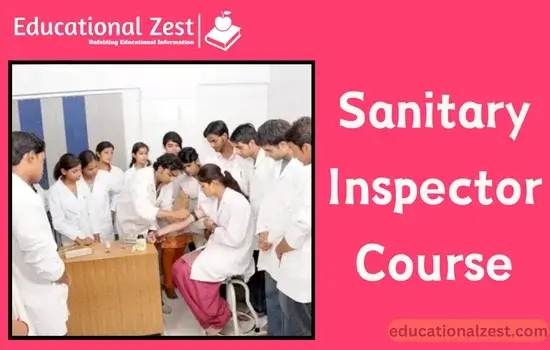Sanitary science is becoming a very important part of public health and hygiene in the recent years. Not only that the course is a very important one in expanding one’s academic options, but also for building career for a broad range of job opportunities. The sanitary inspector functions with his/her specific skills to ensure the health and hygiene needs in the community level. They have a large responsibility and for that, they need to go through the course properly and seriously. Here are all the details about the course and more that you should know if you are opting for this opportunity.
Complete Details of Sanitary Inspector Course

Eligibility
A diploma in sanitary inspection equips public health and sanitation advocates. Candidates for this program normally need certain educational qualifications. This subject requires 10th grade. Students must master essential courses for the sanitary inspection diploma. Senior high school graduates from any stream may apply for this course. This inclusive technique recruits academically diverse sanitary inspectors. This diploma is offered to high school graduates and natural, environmental, or sanitary science bachelor’s degree holders. This route lets science-savvy students specialize in public health and sanitation via study and practice. Sanitary inspection diplomas are available to high school graduates and related degree holders. Multiple entrances attract diverse candidates to boost neighborhood public health and cleanliness.
Syllabus
Public health and environmental hygiene experts learn a lot from a Sanitary Inspector Course. The training covers several important hygiene themes. Students learn how bacteria propagate and control sickness in microbiology. To decrease environmental dangers and safeguard public health, pollution control and environmental health are considered. Students also study public health laws and regulations to understand sanitary standards and enforcement.
The training stresses food safety and cleanliness to prevent foodborne illnesses. Waste management and disposal strategies are studied to improve eco-friendly disposal skills. Public health initiatives also address water supply and treatment for safe drinking.
The course’s duration and structure accommodate various learning styles and schedules. Students might choose full-time, part-time evening, or online programs. Programme graduates may need to pass a certification exam and complete other requirements to become certified local sanitary inspectors who can enforce sanitation standards in various settings.
Career
Development nations respect health and cleanliness, thus public health and sanitation expertise are in demand. As communities realize the link between sanitation and health, demand for health and hygiene inspectors rises. Thus, degrees in sanitary health inspection are growing increasingly popular as individuals seek jobs in this field.
Sanitary health inspection diplomas provide broad skills that may lead to jobs in many sectors. Sanitary inspectors implement laws and check public health. In food, hospitality, and healthcare, sanitary inspectors assure cleanliness and safety.
This course prepares students for environmental and public health advocacy careers. Sanitary inspectors may enjoy community involvement activities that promote cleanliness and health in addition to regulatory enforcement. Graduates have several opportunities to launch sanitation audit and consultancy firms for businesses and organizations seeking cleanliness.
- Teacher
- Research assistant
- Health and sanitary inspector
- Assistant training executive
- Clinical counsellor
Fees
The location, reputation, and kind of school affect Health Inspector diploma fees. Infrastructure, facilities, and teaching resources make private institutions more expensive than public ones. To reflect their knowledge and training, top public health institutions may charge more tuition. City or high-cost colleges may charge higher course fees to offset administrative and operational expenditures. Rural or poor institutions may cut tuition to attract more students.
Diploma in Health Inspector courses typically cost between Rs. 20,000 and Rs. 2 Lakhs, depending on the preceding factors. Prospective students must compare costs to choose a school that suits their budget and goals. Eligible students may earn scholarships, grants, and loans for tuition. Budget-constrained students may get flexible payment options or payments.
Course cost is important, but prospective students should also consider education quality, instructor expertise, placement opportunities, and institution reputation. Quality education may help you succeed in public health and sanitary inspection.
Scope
Today, when public health and sanitation are important, the Diploma in Health Inspector offers several opportunities. Due to the rise in infections and infectious diseases, trained specialists are required to adopt safety measures and limit health risks. Community health depends on paramedical soldiers. Many paramedical abilities qualify individuals for healthcare and public health roles. Health inspectors may provide field assistance, medical care, food inspection, sanitation monitoring, and more. Schools, food outlets, and communities need these duties for health compliance, inspections, and sanitation.
Students prepare for further studies in health inspection with the Diploma. B.Sc. and M.Sc. degrees are available in Public Health, Epidemiology, and Environmental Health Sciences. Specialized research and expertise may improve public health knowledge and practices with doctoral degrees.
Benefits
The Diploma in Health Inspector offers several critical health sector roles. This curriculum is essential for health professionals as public awareness of health and hygiene rises. These professionals manage health infrastructure and public safety. Government and private sectors may employ Diploma in Health Inspector graduates. Municipalities, public hospitals, and private hospitals engage health inspectors to enforce health regulations. Hotels and restaurants require health inspectors for customer safety and hygiene.
The certificate prepares health specialists for academic and professional success. Students may get B.Sc.s in Health Inspector, Sanitation Inspector, Food Technology, and Health Science. These advanced degrees enable students to specialize and pursue further career opportunities in their field. The Diploma in Health Inspector gives immediate employment and a platform for career advancement in the ever-changing health business. Skillful graduates may enhance public health and hygiene and their communities.
Conclusion
When it comes to Diploma in Sanitary Inspector course, then one can be sure that proper training for healthcare and hygiene maintenance is assured there. The candidates need to go through the course with due seriousness. The demand for Sanitary Inspectors is quite high in every nook ad corner of India and therefore, having a proper idea of the entire training and recruitment process is essential.
